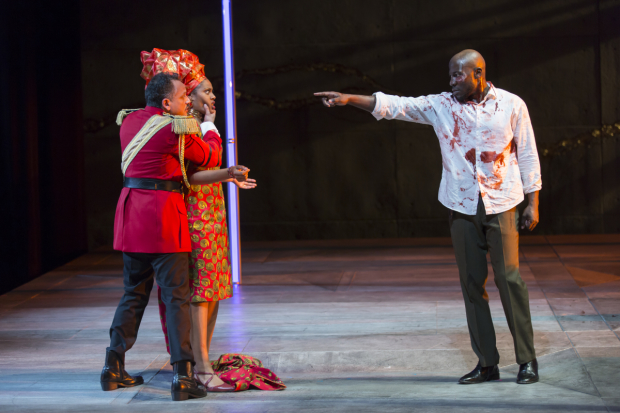Macbeth

(© Scott Suchman)
As director of the Shakespeare Theatre Company's Macbeth, Liesl Tommy chillingly emphasizes the destructiveness of personal and political anarchy in Shakespeare's drama of intrigue and murder. Played out against a background of uncertain place and unknown time – one suspects Africa in the present or recent past — Tommy relates the story of a brutal country full of electronic devices, machine guns, shoulder-fired munitions, bribery, and soldiers (sometimes even child soldiers) dressed in camouflage.
Yet, with the exception of a few modernisms and a clear reference to Russia, this Macbeth is resoundingly Shakespeare's. The vision of a man growing increasingly isolated, the powerful poetry, the lament for a country embroiled in a civil war – it is all his. And thanks to Tommy, that vision and poetry survive in the 21st century, allowing Shakespeare's voice to make sense of a cascade of bloody events.
After fighting off an invading Norwegian army, the generals Macbeth and Banquo are met by three Witches, who promise that Macbeth will become Thane of Cawdor and eventually king. The Witches vanish and representatives of Duncan – here a queen rather than a king – arrive to announce that Macbeth is Thane of Cawdor. Lady Macbeth convinces her husband to murder Queen Duncan while she visits their castle. The morning after the murder, Duncan's sons flee the country. This bloodshed leads to more disasters: Banquo's death, the slaughter of Macduff's family, Lady Macbeth going mad and dying, Macduff fighting until he kills Macbeth.
Jesse Perez plays Macbeth as an upstanding but not particularly muscular military man at the beginning of the play. He rather quickly becomes compromised as he is offered more and more by the Witches, played with cool military precision by Tim Getman, Naomi Jacobson, and David Bishins. Perez's Macbeth almost immediately gives in to the ambition his wife has been fostering in him. Perez's biggest false note is his response when he sees Banquo's ghost, when his terror gives way to antic behavior and a low comedy routine.
Nikkole Salter is very good as Lady Macbeth. She first appears in jeans and a Harvard T-shirt mixing pills and alcohol. She is told via cell phone that Duncan will be coming to visit. Salter does not play Lady Macbeth as inherently evil or passionate but rather as an outsider, a woman for whom social situation is everything. She is proud and fierce through most of the play, but a broken soul when she realizes what she and her husband have done.
Nilanjana Bose does a solid job as Lady Macduff, who tries to protect her young child (nicely played by Trinity Sky Deabreu) when Macbeth's soldiers come to murder them. Marcus Naylor is powerful as Macduff, particularly in the scene when he learns that his wife and children have been killed and he rails at Macbeth. Corey Allen and Nicole King serve well as Duncan's sons, Malcolm and Donalbain, respectively.
Sophia Ramos is excellent as Ross. Myra Lucretia Taylor is superb as the Porter, who adds a rare comic note as she responds to someone knocking at the door by taking the longest possible time to get to the door. McKinley Belcher III is impressive as Banquo, particularly after he returns to haunt Macbeth.
Scenic designer John Coyne has created the perfect setting for this home of a bloody dictator. Against a granite wall at the rear of the stage he has etched what seems to be a thick, imprecise line of gold, suggesting distant mountains. Above the stage hang half a dozen, paper thin gold horizontal curtains, which in the proper light (lighting design by Colin Bills) seem to be as solid as brass.
Costume designer Kathleen Geldard dresses many of the men in the ensemble in camouflage and red berets. Some of the women in the ensemble wear long robes and hijabs. After he becomes king, Macbeth wears formal military dress. Lady Macbeth wears elegant sheath dresses and huge, elaborate headdresses.
No matter where or when you may imagine this Macbeth taking place, it could easily be seen happening anywhere there is or has ever been a civil war. Tommy's Macbeth, despite the play's age, sounds oddly appropriate for this time, whether you're in America, England, or Africa.











